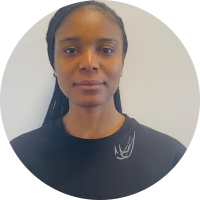
Ade Raissa Zuseh
École Supérieure de Physique et de Chimie Industrielles de la Ville de Paris (ESPCI), FR
DC3: The compertmentalised formose reaction
Supervisor: Prof. Andrew Griffiths

Background
My academic journey began at the Higher Teacher’s Training College at the University of Bamenda, Cameroon, where I spent three years training as a Chemistry teacher. During this period, I developed a strong foundation in both theoretical and practical aspects of chemistry. Eager to deepen my knowledge, I pursued a BSc in Chemistry at the same institution while working as a teacher. This dual role allowed me to gain valuable hands-on experience in the classroom, honing my ability to communicate complex scientific concepts.
Driven by a passion for research, I enrolled in an MSc program in Organic Chemistry at the University of Buea. My research focused on isolating pure compounds from natural products and evaluating their effectiveness against bacterial infections. To explain my findings, I incorporated molecular modelling techniques into my work. After completing my thesis, I was awarded the Erasmus Mundus Joint Master Scholarship to study Theoretical Chemistry and Computational Modelling at the University of Barcelona, Spain. I later spent four months conducting my MSc thesis research at the University of Groningen, focusing on Empirical Valence Bond Theory to study enzyme interactions.
Throughout these experiences, I developed a deep interest in the complex interactions and mechanisms that govern chemical reactions. This curiosity about how intricate chemical systems originate under prebiotic conditions has fueled my desire to explore the fundamental principles underlying the emergence of life. Within the DarChemDN project, I am eager to investigate the compartmentalised formose reaction, combining experimental and computational approaches to advance our understanding of life’s origins.
Secondments
Microfluidics Innovation Center (MIC)
Duration: 1 month
Purpose: Explore new technological developments in microfluidic systems
Parmenides Foundation (PARM)
Duration: 2 months
Purpose: Computationally generate networks related to the formose reaction and look for autocatalytic parts
